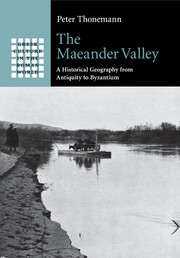Book contents
- Frontmatter
- Contents
- Maps and Figures
- Preface
- Acknowledgements
- Abbreviations
- Map 1 The Maeander valley
- 1 The valley
- 2 Hydrographic heroes
- 3 The nature of Roman Apamea
- 4 The fortress at Eumenea
- 5 The pastoral economy
- 6 The nobility of Mt Cadmus
- 7 The rural economy
- 8 The bounty of the Maeander
- Epilogue The historical geography of the Maeander valley
- Bibliography
- Index
4 - The fortress at Eumenea
Published online by Cambridge University Press: 07 October 2011
- Frontmatter
- Contents
- Maps and Figures
- Preface
- Acknowledgements
- Abbreviations
- Map 1 The Maeander valley
- 1 The valley
- 2 Hydrographic heroes
- 3 The nature of Roman Apamea
- 4 The fortress at Eumenea
- 5 The pastoral economy
- 6 The nobility of Mt Cadmus
- 7 The rural economy
- 8 The bounty of the Maeander
- Epilogue The historical geography of the Maeander valley
- Bibliography
- Index
Summary
The edge of Asia
‘Like the word caelum,’ notes the Latin lexicographer Varro, ‘the word Asia is used in two senses. For it is used both for that “Asia” which is not Europe, which includes even Syria; and also for the nearer part of this aforementioned Asia, in which lie Ionia, and our province.’ Since the fifth century bc, the Greeks had employed a totalising hierarchical division of the world into two unequal parts, Europe and Asia. Africa, which did not fit neatly into this schema, was sometimes added as a third distinct portion of the globe. After Attalus III's bequest of his kingdom in western Asia Minor to the Roman people in 133 bc, the term ‘Asia’ also came to be used by the ruling power in a far more restricted sense, as the proper name for the new Roman province in western Asia Minor, prouincia Asia. In the mid-second century ad, this ambiguity was exploited by the orator Aelius Aristides in his second Smyrnaean oration. Having dignified Smyrna with the title ‘the ornament of Asia’, he adds further, ‘and by Asia I do not mean only that which extends as far as the springs of the Maeander, nor that which is defined by the sortition of your proconsuls, but that which the Greeks have always called Asia, as one of the three continents distinct from the others.’
This fascinating little passage invites analysis from a number of perspectives. Aristides implicitly dismisses the division of the Roman provinces in Asia as a purely Roman spatial conception, meaningful only in terms of the administrative convenience of the external ruling power (‘defined by proconsular sortition’). Simultaneously, Aristides sets up a strategic contrast between the Roman provincia Asia and ‘that which the Greeks have always called Asia’. Cultural anxiety in the face of actually existing Roman rule is a familiar theme of elite Greek literary production in this period. Aristides reminds us that, for the Greeks of western Asia Minor in the second and third centuries ad, the compatibility of ‘being Greek’ with ‘being Roman’ was not the only problem; no less urgent was the need to reconcile ‘being Greek’ with ‘being Asiatic’.
- Type
- Chapter
- Information
- The Maeander ValleyA Historical Geography from Antiquity to Byzantium, pp. 130 - 177Publisher: Cambridge University PressPrint publication year: 2011



